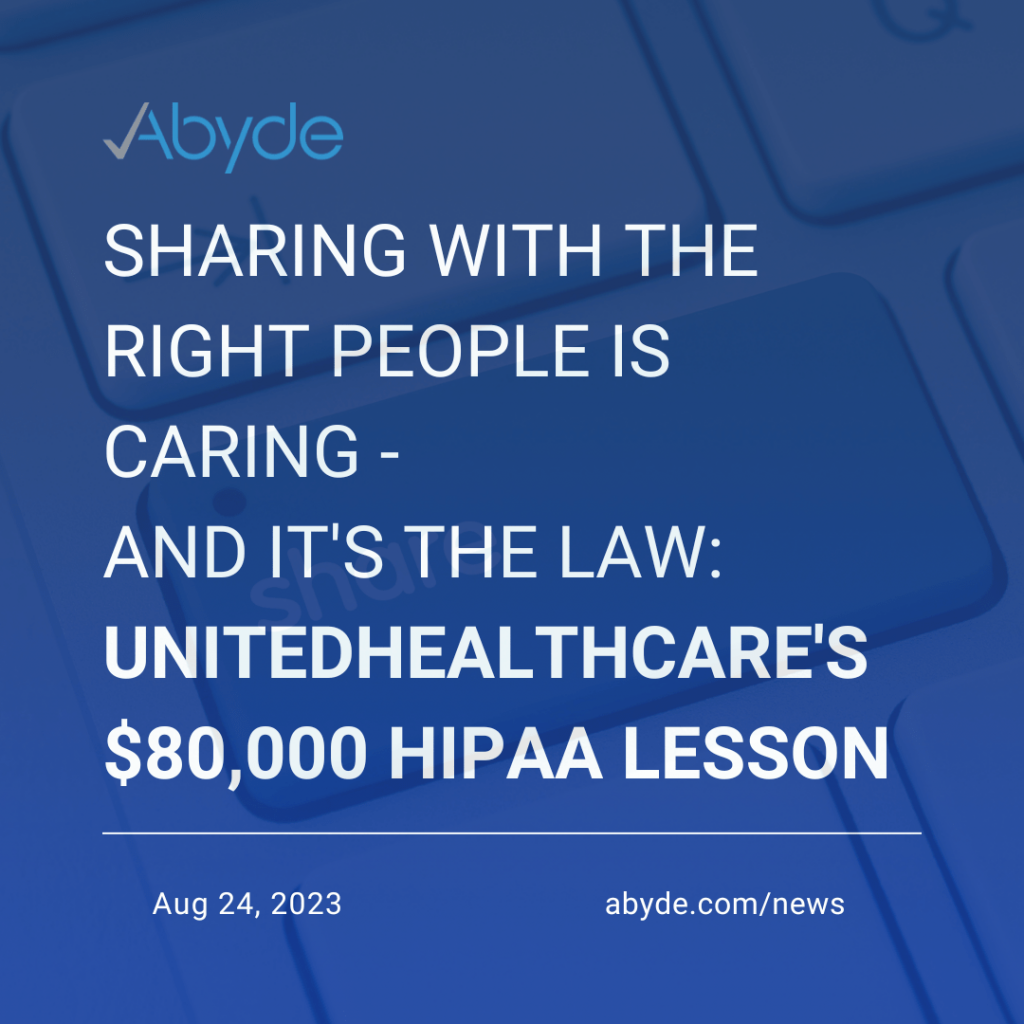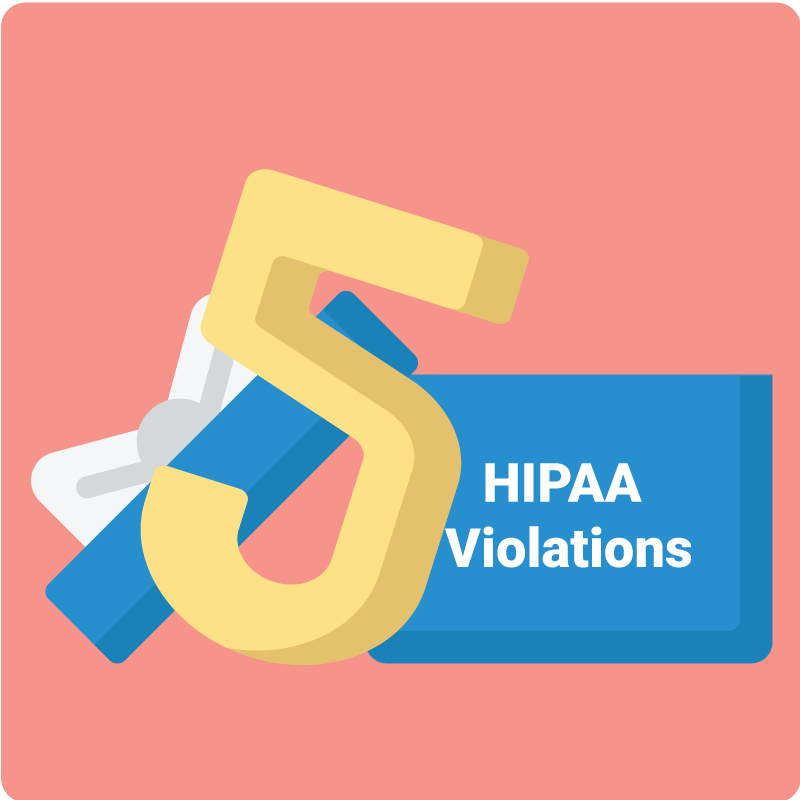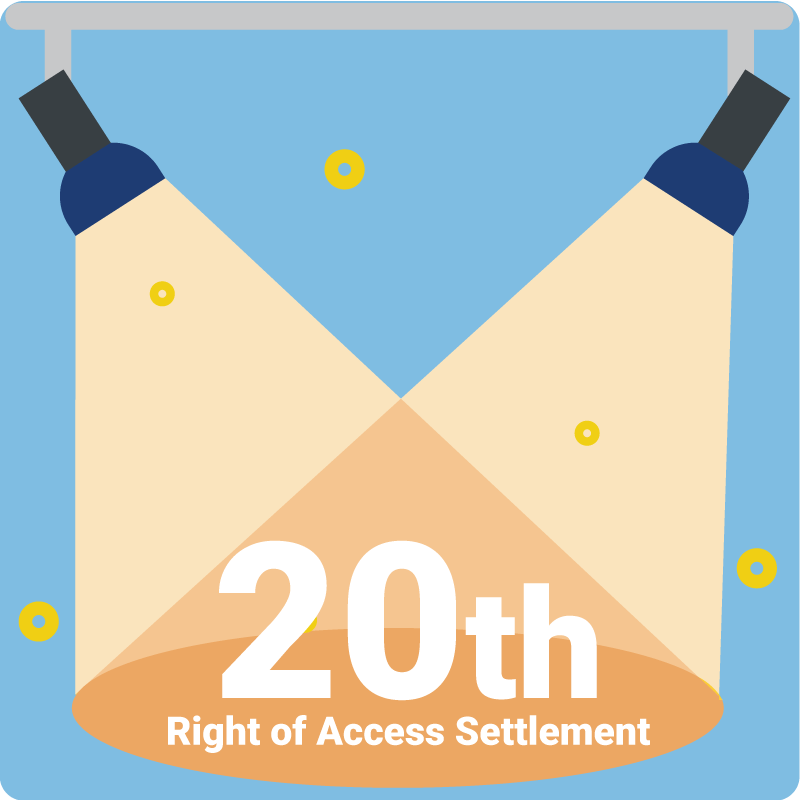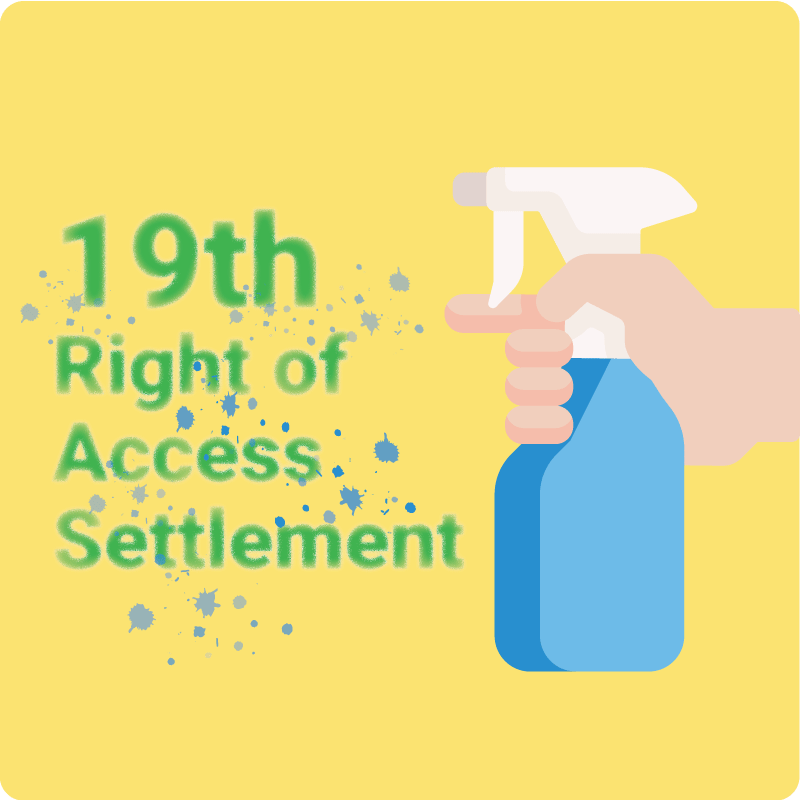August 24, 2023 “Sharing is caring” – an age-old mantra. But in healthcare, it’s all about sharing information with the right people. The recent settlement between the Office for Civil Rights (OCR) at the U.S. Department of Health and Human Services (HHS) and UnitedHealthcare Insurance Company (UHIC) serves as a compelling narrative for this. The Tale of a Delayed Share March 2021 saw a curveball thrown at UHIC when OCR flagged a concerning delay. An individual’s simple request for their medical records, made in January, wasn’t fulfilled until July. The tardiness wasn’t a first for UHIC – it was their third offense. UHIC’s oversight cost them $80,000, a commitment to make amends and a year under the OCR’s microscope. HIPAA makes it loud and clear: Patients have a fundamental right to timely access to their health information. Sharing Timely is Both Caring and Complying Melanie Fontes Rainer, the face of OCR, pointed out that delays aren’t just unkind – they’re unlawful regarding members’ health data. And the cost isn’t just monetary; reputations are at stake, too. Abyde’s Sharing Compass Navigating the maze of HIPAA compliance can be tricky, but Abyde’s HIPAA and OSHA Compliance Software offers a lifeline. Here’s what Abyde brings to the table: Your Path to Smart Sharing UHIC’s story is a powerful reminder of the gravity of healthcare privacy laws. Instead of being the next UHIC, make “Sharing with the right people is caring – and the law” your motto. Let Abyde guide you in this endeavor. Kickstart your journey to guaranteed compliance. Set up a demo with Abyde now. Our mavens will craft a plan tailored to your organization, ensuring you comply and lead in this ever-evolving regulatory environment.
Healthcare Provider Pays $15,000 Due to HIPAA Violation
May 9, 2023 The United States Department of Health and Human Services, Office for Civil Rights (HHS), recently settled a case against the Office of David Mente, MA, LPC, for a violation of the Health Insurance Portability and Accountability Act (HIPAA) Privacy Rule. The healthcare provider, who offers psychological care in Pittsburgh, Pennsylvania, has agreed to pay $15,000 and enter into a Corrective Action Plan (CAP). HHS received a complaint in December 2017 alleging that David Mente, MA, LPC refused to provide individual access to their minor children’s protected health information. After receiving technical assistance from HHS, a second complaint was filed in May 2018 concerning the continued noncompliance with the Privacy Rule. HHS investigated and found that David Mente, MA, LPC failed to provide timely access to protected health information since April 6, 2018. The parties agreed to resolve the matter without further investigation or formal proceedings. David Mente, MA, LPC, will pay a resolution amount of $15,000 and comply with a CAP to address the violation. The healthcare provider does not admit liability, nor does HHS concede that there is no violation of the HIPAA Rules. This situation could have been prevented with the help of the Abyde HIPAA Compliance Software Solution. The software offers a comprehensive and user-friendly solution to help healthcare providers maintain HIPAA compliance by assessing risk, implementing required policies and procedures, and providing ongoing support. By utilizing Abyde, healthcare providers can ensure that they are meeting the Privacy, Security, and Breach Notification Rules requirements and avoid costly settlements like the one faced by David Mente, MA, LPC.
With the first settlement announcement of 2023, OCR selects…
January 4, 2023 We didn’t even make it through the first week of the new year before we saw the first settlement announcement. Yesterday, the Office for Civil Rights (OCR) at the U.S. Department of Health and Human Services announced a settlement with a Georgia full-service diagnostic lab. The potential violation marks the 43rd associated with the HIPAA Right of Access Initiative to date. This is now the third Right of Access settlement we have seen in the last month. The initial complaint was first filed back in August of 2021 when a personal representative was unable to obtain a copy of her deceased father’s medical records. While the lab finally complied in February of 2022, it took seven months for the requester to receive the records. The HIPAA right of access provision requires that patients be able to access their health information in a timely manner, typically within 30 days. The lab has agreed to pay $16,500 and implement a corrective action plan to resolve this investigation. The corrective action plan includes two years of OCR monitoring. OCR Director, Melanie Fontes Rainer, shared her thoughts, “Access to medical records, including lab results, empowers patients to better manage their health, communicate with their treatment teams, and adhere to their treatment plans. The HIPAA Privacy Rule gives individuals and personal representatives a right to timely access their medical records from all covered entities, including laboratories.” While we all have the same goal in common – to provide the best experience for our customers and patients – that doesn’t always equate to direct care. Ensuring that their needs and requests are met is essential to the overall experience. From the first time they Google you all the way to a request for records, you are making an impression. And whether it’s the first impression or the last, don’t you want it to be a good one?
A costly race against the clock
December 16, 2022 On Thursday, the HHS Office for Civil Rights announced a settlement with a Florida primary care practice over a violation of the HIPAA Privacy Rule’s right of access provision. This marks the 42nd case under the Right of Access Initiative to date and the second settlement this week. All the way back in mid-2019, a daughter, serving as personal representative, was attempting to retrieve her deceased father’s records. After multiple attempts, the practice failed to provide timely access. HIPAA’s right of access standard requires a covered entity to take action on an access request within 30 days of receipt. The practice exceeded that allotted time; the daughter received all requested records nearly five months after the initial request. OCR Director, Melanie Fontes Rainer, stated, “The right of patients to access their health information is one of the cornerstones of HIPAA, and one that OCR takes seriously.” The FL primary care practice has since paid its $20,000 fine to the OCR and is working to implement a Corrective Action Plan. The plan will be closely monitored over the next two years and includes updating, distributing, and training on all applicable policies and procedures. In the age of immediacy, there is no exception when it comes to patient record requests. When a patient requests access to their records, prioritize their request. You have 30 days to take action or you could face not only an OCR investigation but a big fine – one we bet is not worth rearranging your priorities to put the patient first.
OCR Settles Three Cases with Dental Practices for Patient Right of Access under HIPAA
September 21, 2022 Boom! Pow! Bang! Three dental practices were sacked yesterday, resulting in nasty bruises and a loss of yards on the play. After heading into the locker room and studying some film, they recognized there were some lessons to be learned in the OCR’s HIPAA Right of Access playbook. The U.S. Department of Health and Human Services (HHS) Office for Civil Rights (OCR) announced the completion of three investigations in its Health Insurance Portability and Accountability Act (HIPAA) Right of Access Initiative. The OCR’s HIPAA Right of Access Initiative started in 2019 to ensure patients receive their records in a timely and costly manner. With three actions in one day and a total of 20 just this year, we are seeing a 42% increase year over year in the enforcement of the Privacy Rule. The OCR’s effort has now raised the total to 41 Right of Access actions across the span of 3 years, setting a strong example for practices across the country on the importance of maintaining compliance. OCR Director, Melanie Fontes Rainer, states, “Patients have a fundamental right under HIPAA to receive their requested medical records, in most cases, within 30 days. I hope that these actions send the message of compliance so that patients do not have to file a complaint with OCR to have their medical records requests fulfilled.” Here is an instant replay of when three dental practices crossed the line of scrimmage: The first dental practice had a delay of game penalty after failing to provide timely access to their former patient’s records. The former patient didn’t receive a complete copy of their records until October 2020, five months after they filed a complaint back in May 2020. This resulted in a $30,000 settlement and the implementation of a Corrective Action Plan. The second dental practice got a 15-yard penalty for not providing a patient with a copy of her records in a timely or costly manner. The practice refused to provide the records because the patient wouldn’t pay the $170 copying fee. That’s not a fair catch! After the OCR got involved, the dental practice had to cough up $80,000 in settlement and adopt a Corrective Action Plan. Maybe they should’ve read the HIPAA Rule book! The starting running back fumbled the ball when this practice failed to provide a mother and her son with copies of their PHI until after the play clock hit zero. After multiple requests and eight months of waiting, she finally got the medical records in her hands. The dental practice had to fork over $25,000 and implement a Corrective Action Plan. After watching the game footage, there is a clear solution here! Make sure your practice provides patients with timely and costly access to their medical records. Six dental practices have been sacked so far in 2022, which means we have already witnessed a 600% increase solely in the dental space compared to the 2021 season. That is not a statistic you can ignore! You could be next, so we encourage you to make sure you have the right compliance measures in place to avoid these large fines. Is your game plan ready?
OCR Announces Eleven More HIPAA Right of Access Settlements
July 18, 2022 Waking up every morning is an eye-opening experience. Do you know what else is an eye-opening experience? Waking up to see all of the enforcement investigations the OCR launched against practices like yours. The U.S. Department of Health and Human Services (HHS) Office for Civil Rights (OCR) announced the completion of eleven investigations in its Health Insurance Portability and Accountability Act (HIPAA) Right of Access Initiative. Under the HIPAA Privacy Rule, the OCR launched this effort to assist individuals’ right to timely access to their health records at a reasonable cost. HIPAA provides individuals with the right to view and get copies of their health information from their healthcare providers and health plans. A HIPAA-regulated entity has 30 days after receiving a request to provide an individual or their representative with their records in a timely manner. OCR Director, Lisa J. Pino, states, “Health care organizations should take note that there are now 38 enforcement actions in our Right of Access Initiative and understand that OCR is serious about upholding the law and peoples’ fundamental right to timely access to their medical records.” Practices are no longer sneaking under the radar! The Office for Civil Rights (OCR) just concluded its thirty-eighth enforcement action since the HIPAA Right of Access Initiative began in 2019. Totaling over $646,000 across eleven penalties, the announcement of the verdicts includes eleven cases. Here is a brief breakdown of a couple of the cases just released by HHS: The first dental action includes a $5,000 settlement for failure to comply with the Right of Access provision stating covered entities must permit individuals to inspect and obtain a copy of their PHI. An eye care practice made the mistake of not providing a copy of a patient’s medical records until three days after the OCR investigated. Now that is crazy! To settle a potential violation of the HIPAA Privacy Rule right of access standard, the practice agreed to take corrective actions and pay $22,500. Something as simple as not giving your patients access to their data quickly enough can result in a huge fine! One not-for-profit health system learned the hard way by not responding timely enough to a complainant’s access request. This cost the health system a whopping $240,000! So, whether it’s responding to a request or delivering that request on time, you need to make sure your practice is on point to avoid these heavy penalties. As we can see the queen bee (Lisa Pino) isn’t joking around on pushing the OCR’s HIPAA Right of Access Initiative across practices, we encourage you to ensure you have the right HIPAA compliance measures in place. So what’s the holdup? For less than a scratch-off ticket a day you can save your practice from those sneaky fines and become friends with Abyde today!
Dentistry HIPAA Fines
March 29, 2022 Dental practices are no longer flying under the radar! The Office for Civil Rights (OCR) just concluded its twenty-seventh enforcement action since the HIPAA Right of Access Initiative began in 2019. Totaling over $170,000 across four penalties, the announcement of the verdicts includes two cases as part of the HIPAA Privacy Rule. The additional actions related to the disclosure of patients’ protected health information (PHI). Here is a brief breakdown of the three dental cases just released by HHS: The first dental action includes a $30,000 settlement against the initially cited $104,000 for failure to comply with the Right of Access provision stating covered entities must permit individuals to inspect and obtain a copy of their PHI. Nearly two-and-a-half years from the time of citation, the practice has completed a package of action plans, creating a costly and lengthy resolution process. Something as simple as Google review responses can get you fined! One provider learned the hard way the dos and don’ts of reputation management. A patient filed a complaint with the OCR after the provider included the patient’s full name and PHI in their review response. This cost the practice a whopping $50,000! Not the usual politician slip up, but a recent provider running for office learned not to mix business and pleasure. As part of his political campaign, the provider shared names and addresses of over 5,000 patients with both his campaign manager and third-party marketing partner to distribute letters and emails. Resulting in a final citation of $62,500, this surely put a roadblock on his campaign trail! As we see the OCR cracking down on their HIPAA Right of Access Initiative across dental practices, we encourage you to ensure you have the right HIPAA compliance measures in place. With an hour of your time, we will get you everything you need. How much is an hour of your time worth – we bet it’s not $170,000!
OCR Settles 5 HIPAA Right of Access Violations
December 1, 2021 In celebration of ‘Giving Tuesday’ this year, the Office for Civil Rights (OCR) came bearing gifts by the handful (literally) – announcing five separate HIPAA Right of Access violations all in one day. Now you might be thinking that this sounds like a historic first for same-day settlements, but just last September, the OCR made a similar five-violation announcement. The latest enforcement brings the Right of Access settlement total to 25 and dollars collected to $1,505,650 since the government announced their enforcement initiative back in 2019. And while the not-so-lucky receivers of the government’s “gifts” range by size, specialty, and location – failing to ensure individuals’ right to timely medical record access is one thing that all of these practices share. Wake Health Medical Group The first of five settlements went to a primary care provider out of North Carolina, who agreed to a $10,000 fine and corrective action plan to resolve their violation of the HIPAA Privacy Rules’ Right of Access standard. Denver Retina Center Violation number two was given to a Denver-based ophthalmologist and included a $30,000 settlement and one-year corrective action plan as a result of their potential HIPAA Right of Access violations. Advanced Spine & Pain Management (ASPM) The third settlement was gifted to a provider of management and treatment of chronic pain services out of Ohio, whose Privacy Rule violations landed them with a $32,150 fine and corrective action plan consisting of two years of monitoring. Rainrock Treatment Center, LLC (dba Monte Nido Rainrock) Violation number four went to a licensed eating disorder treatment provider out of Oregon who agreed to pay $160,000 and participate in a year-long corrective action plan to settle their HIPAA violations. Dr. Robert Glaser And last but certainly not least, the fifth settlement came as a result of not only failing to provide a patient with a copy of their medical records but also lacking cooperation with the OCR. The New York-based internal medicine and cardiovascular disease specialist ignored the OCR’s data requests and waived their rights to a hearing, leaving them with a civil money penalty of $100,000. In addition to the settlement announcement, the recently appointed OCR Director, Lisa J. Pino issued a statement in response: “Timely access to your health records is a powerful tool in staying healthy, patient privacy and it is your right under law. OCR will continue its enforcement actions by holding covered entities responsible for their HIPAA compliance and pursue civil money penalties for violations that are not addressed.” While these gifts might not have come wrapped in a bow, they did bring along a trending theme that we encourage all providers to do some unpacking themselves. Noncompliance with the HIPAA Right of Access standard continues to prove itself as a widespread gap that the OCR is committed to enforcing. So even though we might have to wait until next November to celebrate another “Giving Tuesday” – getting your organization HIPAA compliant and meeting all government requirements – including Patient Right of Access – is the year-round gift that keeps on giving so you can avoid making the next OCR settlement list.
OCR Announces 20th HIPAA Right of Access Settlement
September 10, 2021 There might not be such thing as time travel but with the latest HIPAA settlement announcement, it’s looking like the Office for Civil Rights (OCR) has traveled back to their own version of the Roaring ‘20s. Two years, and now twenty resolutions later, the government initiative to support individuals’ right to timely record access has driven its own little economic boom – with the 20th financial penalty bringing the right of access running total to $1,173,500. Children’s Hospital & Medical Center (CHMC) became the most recent healthcare organization to settle with the OCR, with a fine of $80,000 and requirement to adopt a corrective action plan that involves one year of government monitoring. But while the Nebraska-based pediatric provider probably isn’t too jazzed about the repercussions, the penalty comes as a result of an equally unhappy individual who was not provided the proper access that HIPAA strives to ensure. The issue was brought to the OCR’s attention back in May of 2020 after a parent filed a complaint alleging that CHMC failed to provide full access to her late daughter’s medical records. The complaint stated that while the organization fulfilled a portion of the request, CHMC failed to provide all of the requested records despite the parent’s several follow-up requests. The delay was in part due to the remainder of the requested records being needed to obtain from a different CHMC division but it wasn’t until after the OCR’s investigation that full access was provided. In addition to the resolution agreement, Acting OCR Director, Robinsue Frohboese released in a statement, “Generally, HIPAA requires covered entities to give parents timely access to their minor children’s medical records, when the parent is the child’s personal representative. OCR’s Right of Access Initiative supports patients’ and personal representatives’ fundamental right to their health information and underscores the importance of all covered entities’ compliance with this essential right.” While this settlement shares plenty of similarities with the 19 other examples of noncompliance that we have seen since the enforcement initiative started, it’s important to note the fact that this $80,000 fine was the result of just one patient complaint. And though the Roaring ’20s might’ve been a relatively short-lived era, proposed updates to the HIPAA Privacy Rule and expansions to the OCR budget are enough to predict that the right of access enforcement initiative isn’t going anywhere, anytime soon. So with the latest settlement serving as the perfect example of just how much damage a single HIPAA complaint can have on a healthcare organization – ensuring you’re fulfilling all medical record requests in a timely and HIPAA-compliant manner is essential to avoid becoming lucky settlement number 21.
OCR Announces 19th Right of Access Settlement
June 2, 2021 With the official kickoff of summer only a few weeks away, the Office for Civil Rights (OCR) is getting some last minute spring cleaning in – announcing their latest HIPAA settlement with a practice whose Privacy Rule violations couldn’t be swept under the rug. Diabetes, Endocrinology & Lipidology Center, Inc. (DELC) was handed a $5,000 fine and tasked with a two-year corrective action plan (CAP) to help clean up their “HIPAA mess” that started back in 2019. Today’s fine marks the 19th Patient Right of Access settlement since the OCR officially announced their initiative two years ago. And ironically enough – around the same time that the government was declaring their focus on enforcing the standards around patient rights, DELC became a perfect example of just how many practices weren’t upholding them. The incident began in July of 2019 when a parent requested access to her minor child’s health records. After DELC failed to take timely action in response to the request, a complaint was filed with the OCR in early August 2019. It wasn’t until the OCR got involved that the healthcare organization finally provided access, almost two whole years after the initial request. Though the fine amount might seem on the lower end of what the OCR typically doles out, the corrective action plan has plenty of requirements to make up for it and just to name a few: This hefty “honey-do list” shows that the dollar amount doesn’t cover all the costs associated with violating HIPAA and proves why it’s so important to get your practice’s compliance efforts in order before an incident occurs. So while DELC took longer to fulfill the request than it would to dust off every book in the Library of Congress, the OCR hasn’t delayed in performing quite a bit of housekeeping themselves. With 19 settlements and $1,093,500 collected on behalf of patient right of access violations, the OCR has stuck to their initiative and continued to sweep up any and all violators. And though the settlements all range in resolution amount, corrective action requirements, and organization size and specialty – the message has always been the same and was reiterated by Acting OCR Director Robinsue Frohboese in that, “It should not take a federal investigation before a HIPAA covered entity provides a parent with access to their child’s medical records. Covered entities owe it to their patients to provide timely access to medical records.”








